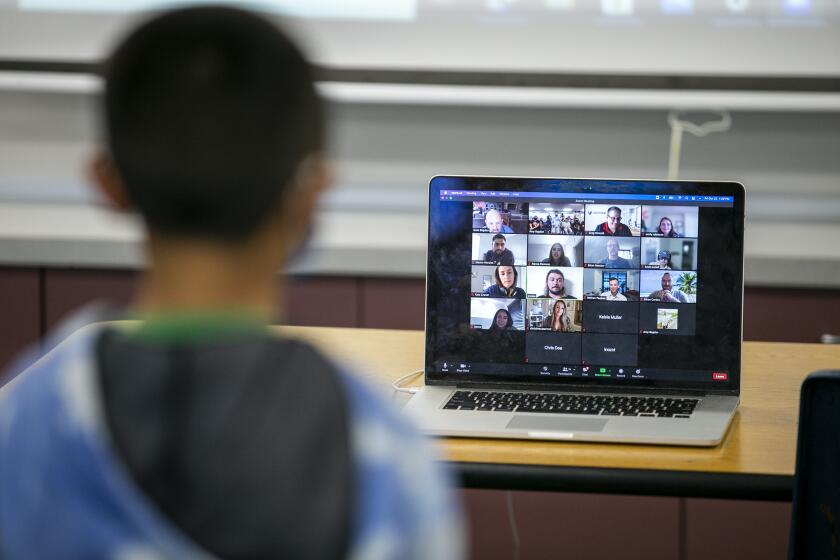Column: Newport should back off on investigation and let D.A. do his job
The action taken by the Newport City Council Feb. 13 to use its subpoena power as it launches its own investigation into potential fraudulent signatures gathered in the effort to recall Councilman Scott Peotter — even though the district attorney has initiated an investigation — is problematic on many levels.
The obvious optic is the majority of this council, with the exception of members Diane Dixon and Jeff Herdman, is looking for retribution against those who dared attempt to recall one of their own.
That aside, what are the legal ramifications with both agencies investigating?
I asked the best legal mind I know, Mario Mainero, professor of academic achievement and executive director of bar preparation and academic achievement at Chapman University, to weigh in.
He confirms that legally the city has the authority to do this because it’s a charter city. The charter, he explains, supersedes the state’s general law, which governs non-charter cities like Costa Mesa, on the subject.
“The legislative body may issue subpoenas requiring attendance of witnesses or production of books or other documents for evidence or testimony in any action or proceeding pending before it,” according to the California Government Code.
“However, this is a far cry from whether the City Council should do so,” Mainero said. “In my view, it should not.”
Explaining that this fraudulent signature gathering is a potential criminal offense, Mainero said, “Only the D.A. has the power to bring charges, if an offense was committed.”
Mainero went on to raise questions like, what if the city tries to grant someone immunity, or witnesses are dissuaded from speaking to the D.A., which could potentially cause the legal investigation to drop charges?
While this wouldn’t “constitute a legal obstruction of justice, it may well constitute a practical one, and achieves nothing that is not just as well achieved by the district attorney’s investigation,” Mainero said.
And what happens if a subpoenaed witness refuses to show up?
Is the city going to seek a contempt complaint?
“That is an expensive proceeding in Superior Court (it would be a form of civil contempt), and one which the city would have to pay for,” Mainero said.
When I posed this issue to City Attorney Aaron Harp he said this in an email:
“We are using city staff to work on the subpoenas and do not anticipate any outside costs for this investigation. We are hopeful the professional campaigners that allegedly committed voter fraud will do the right thing and comply with the lawful subpoenas issued by the city.”
In my opinion, Harp is being unrealistically optimistic here, and the city attorney may also not know the evidence codes as well as lawyers who use it regularly in their practices.
“The city attorney may be well-versed in municipal law, but not evidence law (I know — I teach evidence),” Mainero said. “There are no real protections of due process in a clearly political proceeding, other than invocation of privileges — whether they be self-incrimination, the voting privilege, attorney-client privilege or any other privilege.”
In short, Mainero concluded, “The city is not well-suited to conduct this kind of investigation, where the conduct being investigated is a crime already being investigated by the proper office to do so — the district attorney.”
I wondered if the D.A.’s office had contacted the city or council members asking they not take investigative action and let prosecutors do their jobs.
City Manager Dave Kiff said he hasn’t received anything.
But do the council’s actions here imply little faith in the D.A’s office?
One person openly critical of District Attorney Tony Rackauckas is Orange County Supervisor Todd Spitzer, who is challenging Rackauckas in the upcoming election.
Spitzer said the D.A’.s office under Rackauckas has a history of not prosecuting political corruption, and feels his office should have contacted Newport City Hall, asking it not to compromise the D.A.’s investigation.
“You don’t want multiple agencies in a potential criminal investigation,” Spitzer said.
Spitzer, who served for nearly 10 years as an Orange County deputy district attorney and assistant district attorney, tells me there’s a big difference between being interviewed by non-professional law enforcement investigators and D.A. investigators, who operate with different rules and protections for witnesses.
Spitzer said the D.A. remaining silent regarding Newport’s actions is basically creating a scapegoat for that office, should the investigation go nowhere because of Newport’s interference.
How does the D.A.’s office feel about all of this?
I asked Michelle Van Der Linden, a district attorney spokeswoman, if anyone had contacted Newport asking it not to persue an independent investigation, the criticism about the D.A.’s track record on prosecuting political corruption and why prosecutors are better-suited to investigate this issue than the city.
The matter “is ongoing and under review by the Orange County district attorney’s office and therefore we are not able to provide additional information at this time,” she wrote in reply.
I reached out to Mayor Marshall Duffield and Councilman Kevin Muldoon, who once worked for the D.A.’s office, asking why they felt the city could do a better job investigating here even though they don’t have the ability to prosecute as the D.A.’s office does. They didn’t get back to me.
So will these dueling investigations create even a bigger mess than the fraudulent signatures?
And who investigates this when things go sideways?
Next week I examine the scope of fraudulent signature gathering: It’s more prevalent than you think.
BARBARA VENEZIA is an opinion columnist writing political and social commentary since 2007. She can be reached at bvontv1@gmail.com
All the latest on Orange County from Orange County.
Get our free TimesOC newsletter.
You may occasionally receive promotional content from the Daily Pilot.



